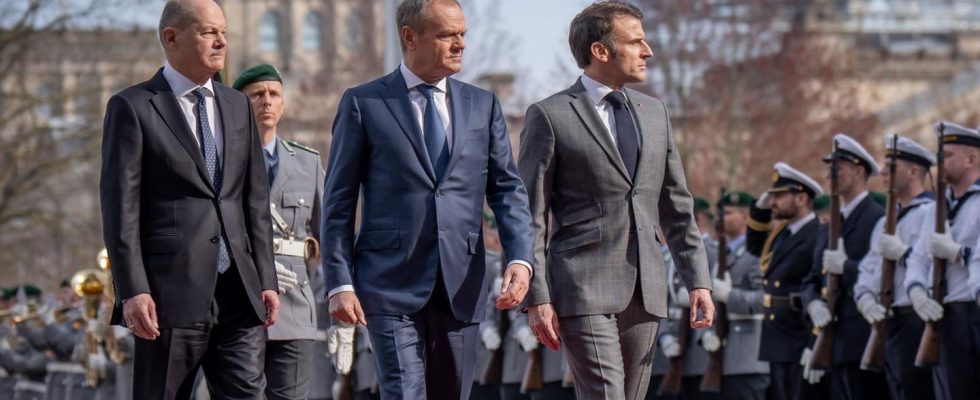Weimar Triangle
Scholz, Macron and Tusk promise Ukraine “even more weapons”
Chancellor Olaf Scholz (l) welcomes his counterparts Donald Tusk (m) and Emmanuel Macron (r)
© Michael Kappeler / DPA
Recently there was a lot of tension between Scholz and Macron. The French president wanted to send ground troops to Ukraine, but Scholz still doesn’t like it to this day. Now both have apparently pulled themselves together again.
In the last few months they have been at odds with each other, but now they have apparently reconciled again – or at least in a mutual way Ukraine strategy agreed: Federal Chancellor Olaf Scholz and French President Emmanuel Macron want to increase arms aid for Ukraine. “From now on we will procure even more weapons for Ukraine,” said Scholz on Friday after a meeting of the so-called Weimar Triangle in the Chancellery in Berlin. They will buy for Ukraine on the world market. “Secondly, we will expand the production of military equipment, including through cooperation with partners in Ukraine.” And thirdly, a new coalition for long-range rocket artillery will be formed within the framework of the Ramstein format.
The EU will also expand its aid and training mission. Windfall profits from Russian assets were intended to benefit Ukrainian defense. “We will use windfall profits from Russian assets frozen in Europe to financially support the purchase of weapons for Ukraine,” Scholz announced.
After the differences over the past few days over the possible deployment of Western ground troops, Macron emphasized: “We are willing. We are decided.” The three governments would do everything and for as long as necessary “so that Russia cannot win this war.” At the same time, the French President emphasized that they did not want any escalation. “That also means that we have to stay united.”
Ukraine aid: Weimar Triangle comes to an agreement
Scholz also reaffirmed the unity of the Weimar Triangle after the open conflict over the Ukraine strategy. “All three of us are serious about our support for Ukraine,” said the SPD politician. Solidarity and joint action are essential to defend peace and freedom in Europe.
“More than ever, our unity is our strength. And our three states, Germany, Poland and France, in particular, have a special responsibility,” said Scholz. The Chancellor promised that Ukraine could rely on support and that the aid would not let up. “We stand closely and unwaveringly at Ukraine’s side.”
It was the first meeting at the top level of this so-called Weimar Triangle since June 2023. The talks took place almost three weeks after the memorable Ukraine conference in Paris, to which Macron invited around 20 heads of state and government and which resulted in a scandal. At the subsequent press conference, the President did not publicly rule out sending ground troops to Ukraine for the first time, which Scholz contradicted several times in the following days.
On Friday, both sides reiterated their positions before the meeting: Macron wants to continue to leave all options for help for the Ukrainian armed forces on the table – Scholz, on the other hand, continues to categorically rule out sending soldiers.

